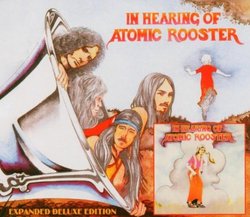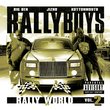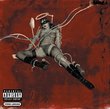| All Artists: Atomic Rooster Title: In Hearing of (Reis) (Dlx) Members Wishing: 1 Total Copies: 0 Label: Castle Music UK Release Date: 4/19/2004 Album Type: Extra tracks, Import, Original recording remastered Genres: International Music, Pop, Rock, Classic Rock, Metal Styles: Europe, Britain & Ireland, Progressive, Progressive Rock, Album-Oriented Rock (AOR) Number of Discs: 1 SwapaCD Credits: 1 Other Editions: In Hearing of Atomic Rooster UPC: 5050159192625 |
Search - Atomic Rooster :: In Hearing of (Reis) (Dlx)
 | Atomic Rooster In Hearing of (Reis) (Dlx) Genres: International Music, Pop, Rock, Classic Rock, Metal
Expanded deluxe reissue of Atomic Rooster's third album, originally released in 1971, includes three rare bonus tracks 'Devil's Answer' (US version), 'Breakthrough' (BBC in concert), & 'A Spoonful of Bromide' (BBC in c... more » |
Larger Image |
CD DetailsSynopsis
Album Description Expanded deluxe reissue of Atomic Rooster's third album, originally released in 1971, includes three rare bonus tracks 'Devil's Answer' (US version), 'Breakthrough' (BBC in concert), & 'A Spoonful of Bromide' (BBC in concert), & a 16-page full color booklet with extensive liner notes, photos, artwork, & memorabilia. Slipcase. Castle. 2004. Similar CDs
|
CD ReviewsIn The Hearing Of Mott Kim Fletcher | Pattaya, Chonburi Thailand | 09/09/2005 (5 out of 5 stars) "In 1969 keyboard wizard Vincent Crane and drumming sensation Carl Palmer, left mid tour of The Crazy World of Arthur Brown's debut American tour citing irreparable differences with the man himself Arthur Brown, not perhaps the most thought through idea in Rock'n'Roll, but sometimes a musician has to do what a musician does. Upon arrival back in England it was decided to put a band together around these two musicians, like minded talents were then sought after, Brian Jones who had just left the Stones was due for a meeting with Vincent Crane the day before he was found drowned in a swimming pool, Rich Gretch was asked but had already hung his star to new supergroup " Blind Faith" with Eric Clapton, Steve Winwood, and Ginger Baker, Jack Bruce was asked as well but was determined to forge out a solo career, when Bruce turned down the bass position John Paul Jones was singled out, but he was already in another heavy metal flyer Led Zeppelin. But all these names does let your mind wander into all the different possibilities that could of happened. The newly branded Atomic Rooster was rolled out with it's debut album 'Atomic Rooster', (1969) with the relatively unknown Nick Graham completing the trio on Bass. The album met with great critical praise but little commercial success, the album is a bluesy affair with not much notice of the heavy rock carnage that was to come. Nick Graham promptly left, (Atomic Rooster never employed a bass player at any time in their following career, Vincent Crane preferring to play the bass notes on his Hammond organ, rather than trust another fickle bass man.) Followed by Carl Palmer who was lured away to be the "P'' in another supergroup "Emerson, Lake, and Palmer. New recruits were sort and two new Roosters were found John Ducann, on lead guitar, who brought along young skinsman Paul Hammond . Immediate success was to follow with the Rooster taking on the hard heavy metal of the day. In November of 1970 this trio's first album was released " Death Walks Behind You" with it's ground breaking Hammond organ sound from Vincent Crane, guitar thunder from Ducann, and powerhouse drumming from Paul Hammond, Further progress was made when the song 'Tomorrow Night' was plucked from the album as a single and reached the Top Ten. 1971 was to prove to be Rooster's year, when they were right at the front of the heavy metal boom, alongside such luminaries as 'Deep Purple', and' Black Sabbath'. A follow up single 'Devil's Answer' was released and met with even greater success reaching Number Two. Whilst in the studio recording this album it was decided to expand the line up to four with the addition of a vocalist and the services of ex-Cactus lead singer Peter French were employed ,an excellent choice. Although French's vocals were laid down so late in the day that the artwork for the album had already been done, so his head had to be painted onto the inside artwork at the last minute. The album "In The Hearing Of" was released in September 1971 and went straight into the Top Twenty. The music is not quite as heavy as that of it's predecessor, but that does not mean it has lost any of it's aggression or grit. Vincent Crane's Hammond organ is not so much in evidence with the piano being used to great effect on a lot of the songs. This is spelled out right from moment go when the Rooster strut their stuff on opener 'Breakthrough', with Cranes hammering piano dominating the song as it pushes it's way into your subconscious, 'Breakthrough' is the perfect opener for this finely selected collection of hard rockin' classics. Of the nine songs on this album (Hit Single' Devils Answer' has been tacked on the end of the original eight album tracks as a welcome bonus) two are instrumentals, only five are sung by new vocalist Pete French, Vincent Crane taking lead vocals on the dark and broody ' Black Snake', whilst 'Devil's Answer' featured the vocals of John Ducann having been recorded before Pete French's arrival. Six songs were written by Vincent Crane, three by John Ducann. One song 'Decision/Indecision' does not even require the services of Ducann's guitar work, with Crane supporting French's emotional vocals on solitary piano, a haunting piece to be sure. Pete French gives a great display as a vocalist on his limited opportunities, but it is perhaps the two rockin' instrumentals, 'A Spoonful Of Bromide Helps The Pulse Rate Go Down' and "The Rock' that would of most pleased the fans from the previous album. The only time during the album that both Vincent Crane and John Ducann actually let go and give it some clout. `In The Hearing Of' was a great follow up to 'Death Walks Behind You.' With great development shown in all parts of the band, but obviously too much development, as each individual wishing to stamp his mark, as is easily seen by the development of each track on this album. With Vincent Crane insisting upon sole leadership of the band, and his exacting standards, this proved too much for the other musicians in the band and before the end of the year the band had splintered leaving Vincent Crane to keep the Atomic Rooster flag flying , which he did with diminishing results with two more albums' Made In England '(1972) and 'Nice'n' Greasy' (1973) both of which departed from the Hard Rock of yore taking a very different Funk/Rock ' slant with vocalist Chris Farlowe on board, much to the horror of Rooster hard rock fans. Pete French went off and formed Leafhound who recorded ' Grower of Mushrooms (1972) Pete French was never to get the success his vocal talents clearly deserved. John Ducann, and Paul Hammond stayed with their hard rock roots and formed 'Bullet', who changed their name to' Hard Stuff', with John Gustafason on Bass and Vocals, recording two impressive albums for Deep Purples newly formed own record label under the Hard Stuff banner' Bulletproof' (1972) and Bolex Demention' (1973). Heavy Rock's waning popularity put paid to any lasting hopes of Rock immortality though. In 1980 when Hard Rock made a major comeback The Rooster of 'Death Walks Behind You' fame reunited for another stab at glory, but their day had gone. The name 'Atomic Rooster' still garners great respect in hard rock circles, but it was really only ' Death Walks Behind You' and 'In The Hearing Of ' that were the real thing. The reformation live album from the Marquee (1980), where funnily enough it is John Ducann's vocals, and guitar that are the most dominant is worth your pleasure if you have an inkling to listen to the live beast. But anything else with the Rooster badge on it is generally advised to be given a wide berth. The world of Rock'n' Roll is not an easy or kind one. Vincent Crane unable to control his inner demons any longer took his own life on Valentine's Day 1989, He was sadly followed by Paul Hammond who could not cope with life outside of his beloved Rooster in 1991. A Tragic end to a band who could of been huge, one of the biggest. But they did leave behind two marvellous albums as an epitaph. By Mott The Dog. " Progressive / Classical meets Hard Rock Harry Clay | Castaic, CA United States | 06/23/2004 (4 out of 5 stars) ""In Hearing Of" was possibly the hardest rocking album of Atomic Rooster, & keyboardist / leader Vincent Crane's, long & varied career.On this 1972 release, Vincent Crane played Hammond B3, Grand Piano, & foot pedal bass (all @ the same time) in a very aggressive, rocking style behind a very heavy & funky rhythm section...that often reminds me of Bonham & Page, with Emerson soloing over the top. The bloozy vocals are somewhat reminiscent of Spooky Tooth.Most of the songs have brooding minor key atmospheres, with dark lyrics...but the band sounds like they were ready to fight, & never give up. Vincent performed spectacular solos on almost every song, although there's not much in the way of guitar solos, which ended up causing dissension in the group. This version of the band broke up shortly after this album's release, & then Atomic Rooster moved into a somewhat more R & B / Rock direction, with subsequent albums.But if you ever wondered what Keith Emerson might have sounded like playing over the top of the early Led Zeppelin rhythm section, "In Hearing Of" is for you. I saw this lineup play live in San Diego in early '72...they were awesome...& this record is an excellent representation of their live sound." Atomic Rooster At Their Peak Mark Gatzke | Plant City, FL USA | 05/03/2005 (5 out of 5 stars) "The real treat in Castle Music's issue is the long overdue inclusion of the U.S. version of Devil's Answer with Pete French singing lead vocals, making "In Hearing Of" a consistent and inspired album from start to finish. Vincent Crane's vision shines brightly on this album, uncluttered by musical missteps or uncertainty. Virtually every AR compilation leans heavily on this album and it's easy to see why. All of the songs are strong and well executed. If you're going to own one Atomic Rooster CD, this is it."
|

 Track Listings (9) - Disc #1
Track Listings (9) - Disc #1
